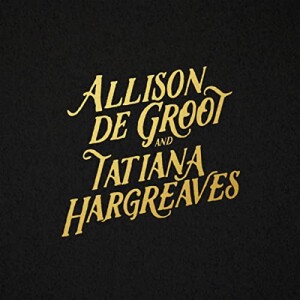 Allison de Groot and Tatiana Hargreaves are two up-and-coming young musicians on the old-time music scene in the U.S. and Canada, and they’ve teamed up for an utterly charming debut as a duo on clawhammer banjo and fiddle, respectively. De Groot is Canadian, studied at Boston’s Berklee College of Music, and has played with leading lights in old-time and Americana including especially Bruce Molsky.
Allison de Groot and Tatiana Hargreaves are two up-and-coming young musicians on the old-time music scene in the U.S. and Canada, and they’ve teamed up for an utterly charming debut as a duo on clawhammer banjo and fiddle, respectively. De Groot is Canadian, studied at Boston’s Berklee College of Music, and has played with leading lights in old-time and Americana including especially Bruce Molsky.
Hargreaves is a local musician to me here in Oregon’s Willamette Valley, and I’ve seen her grow up as a fiddle player on local stages and busking at farmers markets – including one particularly memorable date with Molsky at Pickathon a few years back. She released her debut recording in 2009, got her music degree from Hampshire College, and has played with Gillian Welch, Dave Rawlings, Darol Anger, and on a Grammy-nominated bluegrass album with Laurie Lewis’s band.
Above all else, this is a highly entertaining album of old-time music drawn from a wide variety of sources, played by two very talented young people who sound like they’re having a great time. These two really are in the vanguard of a new generation of musicians playing old-time music but not hewing to the standard form.
Though the bulk of these 13 tracks are old-time fiddle-and-banjo duets, four songs are sprinkled among the list, and good choices they are. (Let me just note that the album’s liner notes are wonderfully complete, and I got most of this information from them.) There’s “Willie Moore,” which Hargreaves picked up from the version by Dick Burnett and Leonard Rutherford on the Harry Smith Anthology. On the lively “I Don’t Want To Get Married” from the Poplin Family of South Carolina, I swear they do some vocal lead swapping between verse and chorus like the Louvin Brothers. Hargreaves takes one really superb fiddle break on this one. She sings lead on the harrowing “Beaufort County Jail,” written by one of their mentors Alice Gerrard, from a true story about a black woman assaulted by her jailer. Hargreaves plays a second banjo quite nicely on this one. Most delightful is “Who Wouldn’t Be Lonely” from the Blue Sky Boys, in which they substitute a gender-neutral pronoun for a modern take on this old-time love song.
But of course it’s the traditional banjo-fiddle duets that are the focus here. They start with the sprightly “Eighth Of January,” from a 1942 recording of Nashville African American street musicians Nathan Frazier and Frank Patterson. Here we get our first glimpse of the kind of droning, circular-patterned music that’s going to be favored by these two on this record. “Farewell Whiskey” they credit to the playing of John Hatcher, who they refer to as “the avant-garde fiddler of 1930s Mississippi.” There are some very modern-sounding, or is that post-modern, fiddling techniques on this one.
My favorite is “Wabash Blues.” De Groot’s banjo takes the lead on this spooky, portentous, darkly driving tune from the playing of the legendary Hobart Smith, who Bill Monroe described as ” … the best old-time banjo picker I ever heard.” The liner notes say it took this duo’s fiddle and banjo just to capture all the sounds made by Smith’s solo banjo on the original recording. Don’t miss “Lonesome Blues, a really fun track on which Hargreaves’ fiddling slips and slides all over the place, or the driving “Cuckoo’s Nest.” And I have to mention the only modern tune of the bunch, “Dry,” which was gifted to them by Judy Hyman of The Horse Flies – a perennial favorite here at Green Man Review.
I’m so impressed by these two and their music. And especially by their open-hearted approach to old-time music, exemplified by this quote from the liner notes in which they acknowledge their cultural appropriation of the art and give credit where it’s due:
“As two musicians who have come from outside of the cultural and geographic communities this music originated in, we are so appreciative of those who have welcomed us and shared their musical and cultural knowledge. We would like to thank all of the musicians who came before us, especially those who never received the credit they deserved: the Indigenous, Black, Queer and female musicians who weren’t always visible but kept, and still keep the music moving forward.”
(Free Dirt, 2019)
